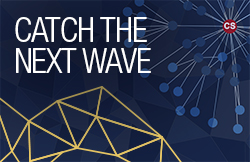News
“CS at Harvard today is small, but excellent,” said Steve Ballmer, AB '77. “It already punches above its weight." (Photo by Jordan Hayashi.)
Cambridge, Mass. – November 13, 2014 – As the field of computer science (CS) continues to undergo rapid advancement and increasingly undergirds discovery in a range of fields, Harvard University announced a significant expansion in CS faculty enabled by former Microsoft CEO Steve Ballmer AB ’77.
Ballmer will join Harvard President Drew Faust and Cherry Murray, dean of the School of Engineering and Applied Sciences (SEAS), to discuss the future of CS at Harvard on Thursday, November 13, at noon EST at the Harvard i-lab. (Update: The event was recorded and can be viewed on YouTube.)
“The growth in computer science at Harvard will enable our faculty to design their own future,” said Faust. “We’re so grateful for Steve’s game-changing support and welcome this opportunity for the School of Engineering and Applied Sciences to take full advantage of the entire University’s distributed strengths.”
Harvard has been home to major breakthroughs in engineering and applied sciences, from the invention of the first large-scale automatic digital computer to advances in cryptography and coding, learning theory, data management systems, algorithmic economics, privacy and security, collaborative planning, and the first self-organizing thousand-robot swarm. SEAS is the newest of the University’s 12 degree-granting Schools, having transitioned in 2007 from a division to a separate school within Harvard, and since then undergraduate enrollment has increased by a factor of three. In the coming years, SEAS will expand into new state-of-the-art facilities on Harvard’s campus in Allston.
A defining characteristic of SEAS is that the School does not have departments. Instead, interdisciplinary teaching areas and research interests guide the faculty and students and encourage collaboration.
“CS at Harvard today is small, but excellent,” Ballmer stated. “It already punches above its weight. With depth in systems, data, machine learning, and artificial intelligence, it is focused on high-impact specialties that are literally changing the world. With this infusion of talent, I believe Harvard will be one of the preeminent, modern CS programs.”
“CS is the operating system for innovation at Harvard,” Ballmer added. “I think Harvard has a unique opportunity. Whether it’s biology, history, public policy, or medicine, the ability to help people get more done through CS is an area where Harvard has the resources and the perspective across these disciplines to be a leader.”
Ballmer earned his bachelor’s degree at Harvard College in 1977. He later joined classmate Bill Gates COL ’77, LLD ’07 (hon.) at Microsoft in its early years and led the company as CEO from 2000 to 2014. In addition to his many philanthropic endeavors, Ballmer is the owner of the Los Angeles Clippers basketball team.
David Parkes, George F. Colony Professor of Computer Science and area dean for computer science at SEAS, noted that the field of research is “at a point where people are asking really deep and important questions about the impact these advancements can have on society, on the workplace, and on mankind.”
“Through this initiative, there is no doubt that Harvard will be able to have a very large impact on the field going forward,” he added.
Find out how CS at Harvard is shaping the future
http://catchthewave.seas.harvard.edu/
Watch the Nov. 13 announcement (recorded)
YouTube
Find out how CS at Harvard is shaping the future
Watch the Nov. 13 announcement (recorded)
YouTube
Topics: Computer Science
Cutting-edge science delivered direct to your inbox.
Join the Harvard SEAS mailing list.




